
Atlus discusses the potential of turn-based battle systems through the lens of Metaphor: ReFantazio
RPG Site had the opportunity to attend GDC 2025 in San Francisco, CA, where the team from Atlus' Studio Zero held multiple lectures regarding the development of Metaphor: ReFantazio (our winner for RPG of the Year, if you missed that).
One of the lectures during the event came from Kenichi Goto, Lead Battle Planner at Atlus, who has previously worked on Shin Megami Tensei: Nocturne, Digital Devil Saga, Persona 4 Golden, and Persona 5. As you can see from his pedigree, turn-based battles are essentially his speciality, and his lecture at GDC was titled "Developing 'Metaphor: ReFantazio' and the Potential of RPG Command Battle Systems".
For those not familiar, 'command battle systems' refer to what we in the West often refer to as 'turn-based' battles.
Turn-Based Battles are the Heart of the Game

In opening his talk, Goto compares turn-based RPGs to a traditional Japanese art form, emphasizing a need to preserve the format while also considering ways to evolve the genre to appeal to modern players.
Goto asks a rhetorical question, "To everybody here, what comes to mind when I say turn-based RPGs? Some of the negative feedback I tend to hear are things like 'it's outdated', 'If you game over, it's a drag to get back to where you were in the game,' 'grinding low-level battles is a hassle..' He admits that turn-based RPG titles have been fading from view in recent years and that there may be a perception that it's now an "old-fashioned" genre.
"But on the contrary, Atlus has grown over the years by creating turn-based RPGs as our forte," Goto declares. "We needed to reinvent this traditional Japanese genre to appeal to modern gamers, especially as our titles increasingly became worldwide releases."
He continues, "I think our struggles will resonate with anyone who is trying to update a traditional game genre for the modern age."
Goto first tackles the topic of 'the grind of low-level battles'. In Metaphor: Refantazio, this led to the combined Fast and Squad battle system mechanics. For those who haven't played Metaphor, Fast Battles are the action components, where you can attack enemies in real-time on the field, and if you are sufficiently leveled, you can defeat them without entering a command-based system at all. If you didn't sufficiently out-level the enemy, then the Fast Battle mechanics could lead to an advantage (or disadvantage) when the battle switched to the more traditional Squad Battle mode.
Goto states that Metaphor: Refantazio was planned to blend together components of command-based battles and action elements from its earliest conception. The first thing Goto wanted to reduce was the number of battles fought where the player's victory was a foregone conclusion. The 'low-level' battles, that is, fights that posed no threat but still took time to play out.
According to Goto, the Fast Battle system "was inspired by the desire to reduce the number of battles where the result of who would win is obvious from the beginning because, let's be honest, players find that annoying. One of the main reasons turn-based battles have become less popular is that battles start to feel like chores." The team had a desire to shorten the time needed on overly easy battles against weaker enemies. Goto also states that it was important that the battle rewards of Fast Battle be the same as those of Squad Battles, so there was no reason *not* to simply breeze through them on the field.
Goto makes a key distinction here, "So you can say that this action element came into the picture as a means to an end, not as action for the sake of itself. This reasoning may seem similar, but they're actually completely different. During the development of Metaphor, losing sight of this fact is what almost led to losing our way overall."
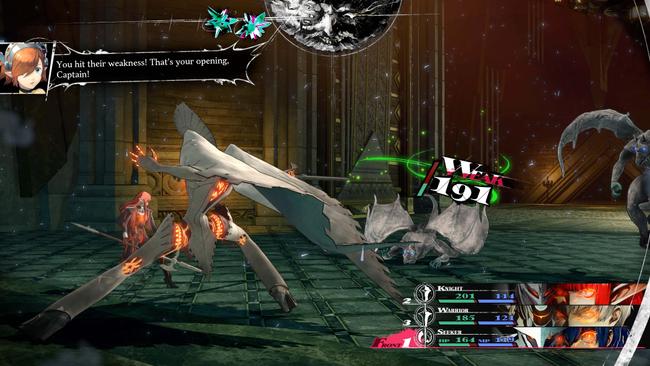
Goto then shares an anecdote. During the development period of Metaphor: ReFantazio, there was a time when any enemy on the field could be defeated in Fast Battle, not just low-level foes. "For us developers, the highly interactive nature of action was undeniable, and it was also easy to come up with fresh new ideas," Goto admits. With this system in place, Atlus began conducting playtests where players could defeat any enemy on the field in Fast Battle, if they put in the effort to do so. However, playtesters exhibited confusion here, stating that it was hard to decide whether they should go into turn-based Squad Battle mode, or if they should attempt to always defeat enemies on the field in Fast Battle. They couldn't figure out which method was the "correct" way to play.
Additionally, when given the option to defeat enemies purely in Fast Battle mode, several playtesters were overly worried about using up their MP in Squad Battle. According to Goto, they would do anything, no matter how unrealistic, to finish battles on the field alone. That was despite the fact that Squad Mode provided more battle options, allowing players to defeat enemies faster and efficiently with precision. No matter how Atlus adjusted the game at this point, some players were worried about wasting MP, who always felt that entering the turn-based battle was a form of succumbing or failure. "This wasn't something relevant to any objective number or datapoint. It was simply the player's subjective perception of the gameplay experience." Goto concludes.
"And this was a critical problem." Goto continued. "To address this issue, we reassessed what our vision of the game should be. We decided it was vital that action exists only to reduce the number of obvious fights. We made it clear within the team that action only exists to smoothly lead the player into the heart of the game, which is the turn-based battles. When you look at the final product, you might think, well, that's obvious. But it was important that we put our core game concept into actual words."
So, this led to the system that manifested in the final version of Metaphor: ReFantazio. Goto concludes his first anecdote, "It was important for us to reconfirm what we initially set out to do and what the core of the battle experience should be." His presentation slide at this moment boldly highlights: Turn-Based Battles are the Heart of the Game.
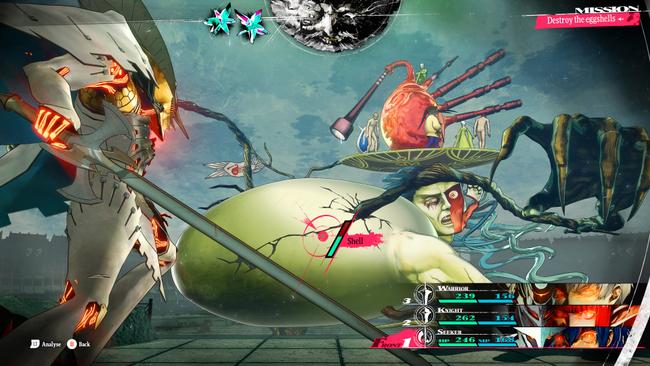
Defining an RPG with Resource Management
In the next section of his lecture, Goto makes a declaration. "RPGs are basically resource management games."
(Anyone who listens to our podcast knows that I've been saying this, so hearing it straight from a veteran developer's mouth was a bit cathartic, not going to lie.)
Goto explains, "The main challenge in an RPG is: 'Can you reach your goal before you use all of your resources?'. One of the most important resources is what we often call MP, or points that you use to take actions like attacking or healing. How to allocate your MP is a main pillar in a game's resource management." Goto highlights HP, MP, and items as key resources in this example. "When you're making RPGs, you also need to create situations where players are forced to decide how to use their resources.", he continues.
At this point in his lecture, Goto went into detail about the random battles of Shin Megami Tensei: Nocturne, and while Atlus RPGs have evolved since then in various ways, many of the core components of battles and resource management have stayed the same. It was interesting to hear his point of view on how he feels 'ambush attacks' from enemies in turn-based games factor into his core design philosophy, but implementation has changed from their origins in pure luck.
Goto laughs at himself, "Many players find Atlus RPGs quite punishing. On the Internet, you can find people who call us battle planners 'sadists' or 'the devil himself'. Ouch. I mean, I'll admit sometimes it's fun to go a little overboard."
He continues, "But why do we make Atlus RPGs like this? There is a specific reason. In Persona and Metaphor, the rewards you gain from your journey and daily activities are used to enhance you for battle. Therefore, we must make players think that they need these rewards to strengthen themselves as they proceed to take on stronger enemies later in the game. To put it differently, players need to find battles difficult enough so that they can't be cleared easily without these rewards. Otherwise, they'll end up skipping everything aside from the battles. That would essentially mean the death of the game entirely, when the players don't really have to think about what they're doing."
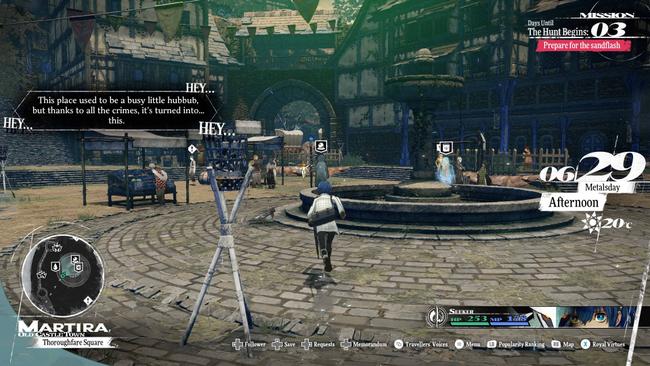
Goto realizes that there is a limit to his 'sadist' tendencies. "However, if battles are too hard and the player reaches game over too often, that's just stressful. That's not good game design because you're not thinking of what the players want."
Goto then goes into more modern additions made to Metaphor: ReFantazio to reduce this stress, if only even just a little bit. Namely, he points to the Rewind System, which allowed players to start over any battle from the beginning at the press of a button. If a player doesn't like where the battle is going, or they feel like they were simply unlucky, they can try again, without using resources, as long as it was during their turn.
"This is an idea we had from the early stages of development. It may seem extreme, but surprisingly, barely anyone during development opposed a bit, including the battle design team." Goto says.
Goto discusses how playtesters would sometimes abuse this feature to make sure opening hits land. He's also aware many people used Rewind to force a successful steal early in the battle.
"You could say that this was cheating the game, in a way, but we decided that it was still worth it ... And there's actually an odd sense of satisfaction in this, almost like you got away with something. It helps players deal with feelings of unfairness if something unexpected happens, that they sometimes get to have fun cheating the game a little bit. Ultimately, it ended up being a really fun addition to the game without spoiling it."
Goto emphasizes other small additions to more modern games that help give players a sense of satisfaction, such as how Autosave allow players to go back and adjust archetypes easily, even if they ended up going into battle with archetypes that were disadvantageous against their enemies. He explains that Autosave actually entices players to take more risks, because they could always try again from a very recent point.
Goto encapsulates the tricky balance he tried to maintain in Metaphor: ReFantazio: "Modern users, especially those in Japan, are very sensitive to feeling like they wasted time. For example, when they reach a game-over screen, they feel like their efforts went to waste. But it's important to keep gamers thinking that they're on the edge of reaching game over to keep that sense of excitement and danger. Mitigating players' emotions that their efforts went to waste was out approach to making a modern gameplay experience. To satisfy modern players, it's important to balance a feeling of danger that the player might hit game over, while also ensuring a feeling of safety that even if they do, time loss would be kept to a minimum."
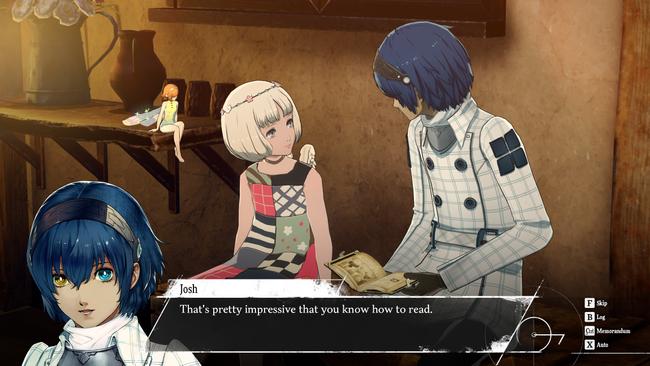
Nobody Likes to Write Reports, Nobody Likes to Read Reports
To end his lecture, Goto discusses ways in which Atlus's playtesting organization changed during the development of Metaphor: ReFantazio. While it has always been Atlus policy to take opinions from all across the development team when making games, they began to realize that the old method of asking playtesters to submit their opinions in the form of reports did not produce the best results.
Goto explains that in the playtester's eyes, "'I have to write a report. It's part of my job. I have to write something...' it felt like it became a race to find as many problems as possible. Because there was such an avalanche of reports, the director could not read them all by himself and had to delegate them. That placed pressure on the respective leads for each element. And we need to remember that people are not machines. Even if it is constructive criticism, human beings can only take so much negativity."
"Even though they knew logically that it wasn't personal, criticism in the form of writing can, at times, come off harsh. In the end, it was just too much for some planners to even look at the reports anymore," he continued.
In looking for new ways to playtest games, Atlus began internally live-streaming the playtest sessions. Atlus set up web cameras and meeting rooms and broadcast each test player's screen individually. Team members could chat with each other in real-time about the player experience that they were seeing.
"Productivity among our team rose significantly because they could watch the live streams while they did other work. Just the process of reading reports takes up a lot of time ... But with this new system, we could watch the livestream from our desks, which meant we could do other work while waiting for the player to reach points in the game related to our field of expertise. And once the tester got to a part of the game you wanted to focus on, the relevant team could gather and exchange ideas and observations in real-time while watching the stream."
Goto also stated that this new method of live-stream playtests would offer results that would not necessarily be caught through self-reporting. For example, let's say a tester took out an enemy in three turns even though it was designed it to take about five turns to defeat. The tester wouldn't know that, so they wouldn't report it. However, Atlus was able to flag this balance issue by looking at the player experience through the screen.
"We were also able to notice minor things that didn't necessarily bother the testers too much... We were able to pick up on situations like, 'this player is lost here even though they shouldn't be, and it's just by pure luck that they found their way through.' Though things like these are not self-reported, these are problems for the game that we needed to fix, which we dealt with by adding tutorials and NPCs or changing relevant text. They're small details, but they really add up to improve the quality of the game."
Importantly, Goto stated that the new live-streaming testing methods reduced stress from reading reports, and the team felt more proactive in finding things to fix themselves.
"A lot of nuance and details just don't come across in a written report, which goes to show that there is still value in talking face-to-face. This whole system improved our internal teamwork as well as team members themselves sought out things to make better rather than one side lead being told what to fix. Playtest live streaming was great in so many ways, improved productivity, allowed the team to identify issues not reported by testers, and brought about a positive forward-thinking attitude among our staff."
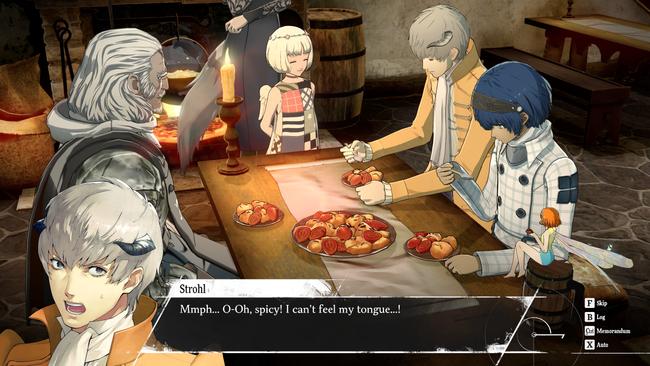
Here, Goto concludes his lecture, "I believe it's possible to keep even an old-school game genre fresh by identifying what modern users want and not losing sight on what you want to achieve. I personally believe that turn-based games have a long future ahead of them. And more than anything, just selfishly, I'm personally looking forward to all the innovations that creators will bring to the RPG world in the future."